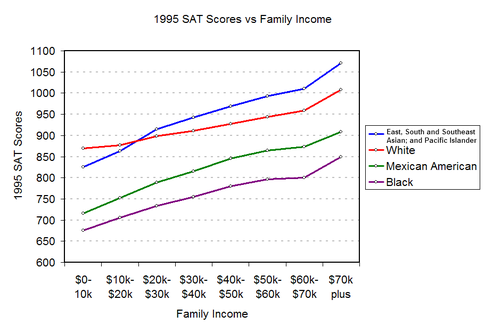My post was assuming the OP was correct. Downtown's post clarified that it was just goals and not tests actually being given extra points, which I didn't see when writing my post.
Ah, gotcha.
My post was assuming the OP was correct. Downtown's post clarified that it was just goals and not tests actually being given extra points, which I didn't see when writing my post.
Standards should not be lowered for any reason whatsoever (including income). How can we compete with China by lowering our standards?
Standards should not be lowered for any reason whatsoever (including income). How can we compete with China by lowering our standards?
At OP,
I'd say standards should based on demographic data in general, but reducing it all to gender and race is basically wrong.
Wouldn't that depend on whether those things are major explanatory variables in a particular place? How can such a statement be absolute?
Why am I not surprised that you are trying to turn this into yet another "racialist AA nonsense" thread?Funny I should read this on the same day it was announced the Brazilian government will institute a 30% quota for blacks and mulattos in all civil service admission exams... and if that's not enough, they'll criminally prosecute people who "falsily" claim to be black in order to get easier access to the civil service. I wonder how they'll prove someone is lying - maybe they'll hire some doctor who worked at Auschwitz or something and is a racial expert.
Anyway, the world is going mad. Thanks for creating this racialist AA nonsense, USA, but please try to keep it for yourselves next time you have one of those brilliant ideas. So please don't spread this notion of different academic standards for different "races", because I know the ******** Brazilian government will copy it...
This.This headline is misleading. The district isn't setting goals for specific students based on their race, only that they want to improve their race-based academic achievement gap. I would hope that every single large district in the country would want this goal.
Eventually, you want 100% of all students to hit the benchmarks, but you have to hit the baby steps along the way.
It is also instructive to note that the decision to include these subgroup goals come from the Obama administration's No Child Left Behind waiver application (attached below). The first permissible waiver request is to get out of meeting federal Adequate Yearly Progress requirements, with the understanding that the state would "develop new ambitious but achievable (annual measurable objectives) in reading/language arts and mathematics in order to provide meaningful goals that are used to guide support and improvement efforts for the State, LEAs, schools, and student subgroups."
Florida's plan, fully vetted by the U.S. Department of Education more than a year ago, states: "The annual achievement results on assessments will continue to be reported for subgroups and all students. Floridas new AMOs will be reported for all schools, LEAs, and the state."
While the goals may be distasteful to some, they shouldn't come as a surprise.
Nope, we all know you are a CSA apologist and believe that businesses should be allowed to change their standards of service and willingness to hire based on race..I'm pretty confident that I don't really need to point out what my stance on different standards for different races is.
Well then when you're setting your targets for reading levels you factor that in and do sub-targets. Which is what's being described here. Where are you people getting all this other stuff from?
Nope, we all know you are a CSA apologist and believe that businesses should be allowed to change their standards of service and willingness to hire based on race..

The only people who seem to believe that are the racists. This is merely an attempt of acknowledging the problem and trying to take steps to eventually resolve it, much like the other measures from the past you seem to find so appalling.So what is this sub-targeting accomplishing other than furthering the (apparently very entrenched) notion that different "races" have different capabilities?
Why would you boycott? Isn't that holding them to a different standard than non-racists?You forgot the part where I said I would boycott any business that did so
Wouldn't that depend on whether those things are major explanatory variables in a particular place? How can such a statement be absolute?
What I find disconcerting is the graph that shows that children of affluent Mexican-American and black parents have far lower test scores that the other groups. Even they don't seem to be immune from the effects of this.

But if socio-economic forces were not the explanation (which they are), this would be essentially setting different targets for ever. This would just lead to people assuming that some "races" are less capable.
Also, there is of course far more "intra-racial" variance than "inter-racial" variance. I am willing to bet that some asian groups (wild guess: filipinos) don't do nearly as well as others (other wild guess: koreans). The same is certainly true for latinos(Argentine-Americans are wealthier and more educated than the average American), and even blacks and whites. It doesn't make sense to create sub-targets for groups that are vastly heterogeneous, just because in average asians do better than whites who do better than blacks. This average means nothing.
So what is this sub-targeting accomplishing other than furthering the (apparently very entrenched) notion that different "races" have different capabilities?
This. Although I do not quite understand why such things are even measured by race.This headline is misleading. The district isn't setting goals for specific students based on their race, only that they want to improve their race-based academic achievement gap. I would hope that every single large district in the country would want this goal.
Eventually, you want 100% of all students to hit the benchmarks, but you have to hit the baby steps along the way.
